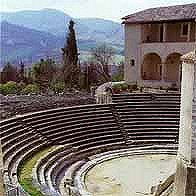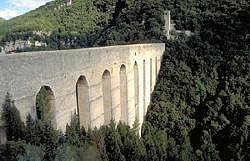Spoleto -
Over 2500 Years of History
 |
| Teatro Romano |
Already in the 3rd century BC the city came under the influence of Rome in the form of a colony named Spoletium. After the severe defeat suffered by the Romans at the Battle of Lake Trasimene, Spoleto successfully fended off Hannibal’s besieging armies and became a valuable ally of Rome during the Punic Wars. The city was known for its magnificence already in 100BC but its fortunes followed closely those of the Roman Empire, through to its fall.
In 576 Faroaldus I chose the city as the seat of the Longobard Duchy of Spoleto, which became a vassal of the Franks in 774. With the division of the Carolingian empire, both Duke Guido III and his son Lamberto were crowned (890 and 892) Emperors of the Holy Roman Empire by the Pope. But Spoleto was a frequent bone of contention in the struggle for power between the Papacy and the Empire. In 1155 the city was destroyed by the armies of Frederick I Barbarossa, but in 1240 Spoleto passed under the Church even though it had declared itself a free city.
 |
| Ponte delle Torri |
Between the 17th and 18th century the city’s noble families employed a conspicuous quantity of Roman architects and artists to renovate their family houses and the churches of Spoleto. During the French occupation under Napoleon, Spoleto was the headquarters of the Trasimene Départment. After the Restoration it became the seat of the Pontifical delegation. With the unification of Italy, however, the city’s importance declined in favour of Perugia, which was appointed the regional capital of Umbria.
Recently the idea of creating a third province in Umbria, with Spoleto as its capital, was discussed, but came to nothing after nearby Foligno advanced claims to such a position.br />
As well as boasting a startling array of architecture and art, the name of Spoleto has travelled the world also on account of the Two Worlds Festival founded here in 1957 by the composer Giancarlo Menotti. The festival runs every year from the end of June into early July and remains one of Italy’s most prestigious events of its kind, featuring music, opera, ballet, theatre and the visual arts.
The city also hosts the Settimana di Studi sull‘Alto Medioevo (a week of studies focussing on the Middle Ages), organised in April by the University of Perugia, the cycle of organ recitals (April-June), the Stagione del Teatro Lirico Sperimentale (end of August - early October), the international “Orpheus” competition (August - September) and the international Opera Prima “V. Rippo“ prize (September).
© Copyright 2001-2025
by Umbriaonline.com
SCG Business Consulting S.a.s. di Giacomelli E. & C. - Internet Advertising Division - © 2001-2025 All Rights Reserved - P.IVA 01675690562